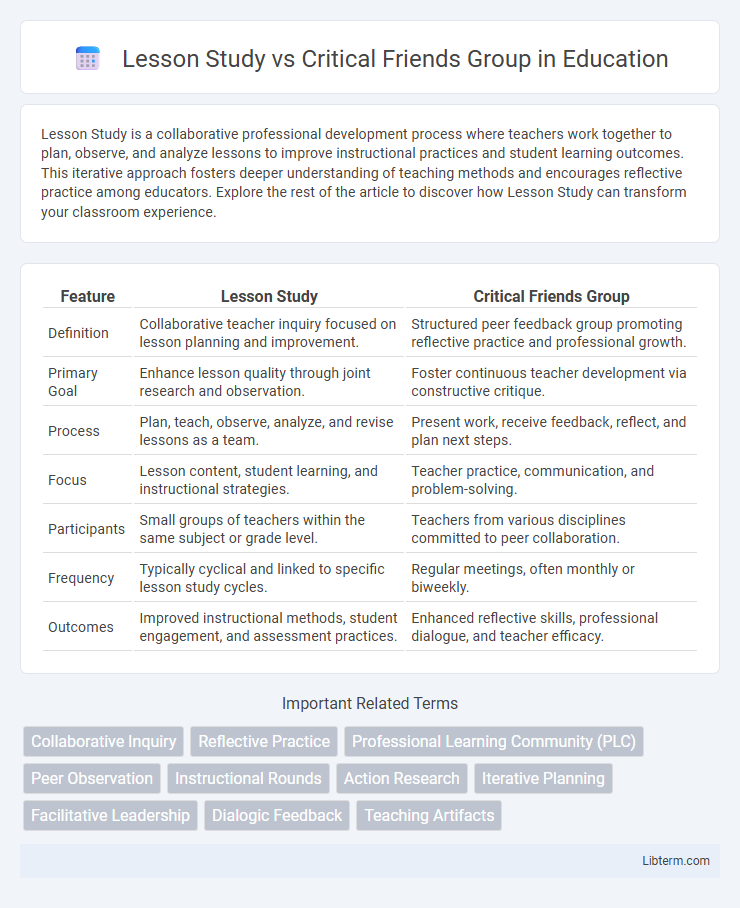Lesson Study is a collaborative professional development process where teachers work together to plan, observe, and analyze lessons to improve instructional practices and student learning outcomes. This iterative approach fosters deeper understanding of teaching methods and encourages reflective practice among educators. Explore the rest of the article to discover how Lesson Study can transform your classroom experience.
Table of Comparison
| Feature | Lesson Study | Critical Friends Group |
|---|---|---|
| Definition | Collaborative teacher inquiry focused on lesson planning and improvement. | Structured peer feedback group promoting reflective practice and professional growth. |
| Primary Goal | Enhance lesson quality through joint research and observation. | Foster continuous teacher development via constructive critique. |
| Process | Plan, teach, observe, analyze, and revise lessons as a team. | Present work, receive feedback, reflect, and plan next steps. |
| Focus | Lesson content, student learning, and instructional strategies. | Teacher practice, communication, and problem-solving. |
| Participants | Small groups of teachers within the same subject or grade level. | Teachers from various disciplines committed to peer collaboration. |
| Frequency | Typically cyclical and linked to specific lesson study cycles. | Regular meetings, often monthly or biweekly. |
| Outcomes | Improved instructional methods, student engagement, and assessment practices. | Enhanced reflective skills, professional dialogue, and teacher efficacy. |
Introduction to Collaborative Professional Learning
Lesson Study and Critical Friends Group both serve as collaborative professional learning frameworks designed to enhance teaching practices and student outcomes. Lesson Study involves teachers collaboratively planning, observing, and analyzing lessons to refine instructional methods, while Critical Friends Group emphasizes structured peer feedback and reflective dialogue to foster continuous improvement. Both models prioritize collective inquiry and shared responsibility, advancing teacher efficacy through systematic collaboration.
Defining Lesson Study: Origins and Principles
Lesson Study originated in Japan as a collaborative professional development approach where teachers systematically plan, observe, and analyze lessons to improve student learning outcomes. Its core principles include collective inquiry, continuous reflection, and iterative lesson improvement, emphasizing deep understanding of student thinking and instructional effectiveness. Unlike other models, Lesson Study integrates planning, teaching, and reviewing within authentic classroom settings to foster sustainable teacher growth.
Understanding Critical Friends Group: Key Concepts
Critical Friends Group (CFG) centers on collaborative reflection where educators engage in structured dialogue to improve teaching practices through honest feedback and shared inquiry. CFG emphasizes trust, confidentiality, and constructive criticism, enabling participants to challenge assumptions and explore diverse perspectives for professional growth. This process fosters a supportive community focused on continuous improvement and student-centered outcomes.
Goals and Outcomes: Lesson Study vs Critical Friends Group
Lesson Study aims to improve teaching practices through collaborative lesson planning, observation, and reflection, resulting in enhanced instructional strategies and student learning outcomes. Critical Friends Group focuses on peer feedback and professional dialogue to foster reflective teaching and continuous improvement, leading to stronger teacher collaboration and professional growth. Both approaches prioritize teacher development but differ in structure and emphasis on lesson refinement versus reflective feedback.
Process and Structure Comparison
Lesson Study follows a collaborative process where educators jointly plan, observe, and analyze a lesson to improve teaching practices through in-depth feedback cycles. Critical Friends Group operates through structured peer coaching meetings, emphasizing open dialogue, reflective questioning, and mutual support to address specific teaching challenges. Both frameworks rely on iterative reflection but differ as Lesson Study centers on lesson design and iterative classroom experimentation, whereas Critical Friends Group focuses on sustained peer feedback and problem-solving conversations.
Roles and Participation in Each Model
Lesson Study involves collaborative inquiry where teachers collectively plan, observe, and analyze lessons, emphasizing active participation from all members to improve instructional practices. Critical Friends Group relies on a structured peer feedback process with designated roles such as facilitators and presenters to promote reflective dialogue and professional growth. Both models prioritize teacher collaboration but differ in participation: Lesson Study requires joint lesson development and observation, while Critical Friends Group centers on facilitated critique and discussion.
Impact on Teaching Practice and Student Learning
Lesson Study fosters continuous collaborative inquiry among teachers, leading to targeted instructional improvements and enhanced student engagement through iterative lesson refinement. Critical Friends Groups provide structured peer feedback that cultivates reflective teaching practices and deeper professional trust, resulting in more responsive and adaptive classroom strategies. Both frameworks positively impact student learning by promoting teacher collaboration, though Lesson Study emphasizes lesson design and evidence-based adjustment, while Critical Friends Groups focus on reflective dialogue and peer support.
Challenges and Limitations of Each Approach
Lesson Study faces challenges including time constraints for collaborative planning and difficulty sustaining long-term teacher engagement, limiting its consistent implementation across schools. Critical Friends Groups encounter limitations such as potential groupthink and reliance on trust-building, which can hinder honest critique and reduce effectiveness. Both approaches require strong organizational support and commitment to overcome these barriers and achieve meaningful professional growth.
Choosing the Right Model for Your School Context
Selecting the appropriate model between Lesson Study and Critical Friends Group depends on your school's collaborative culture and professional development goals. Lesson Study emphasizes structured, in-depth lesson planning and observation cycles ideal for schools prioritizing pedagogical refinement. Critical Friends Group suits environments seeking ongoing peer feedback and reflective dialogue to foster continuous instructional improvement.
Conclusion: Integrating Collaborative Approaches
Integrating Lesson Study and Critical Friends Group enhances teacher collaboration by combining in-depth lesson analysis with reflective peer feedback, leading to improved instructional practices. Both approaches prioritize professional learning communities, fostering continuous growth through shared expertise and supportive dialogue. This integration creates a dynamic framework that strengthens teaching effectiveness and student outcomes.
Lesson Study Infographic

 libterm.com
libterm.com